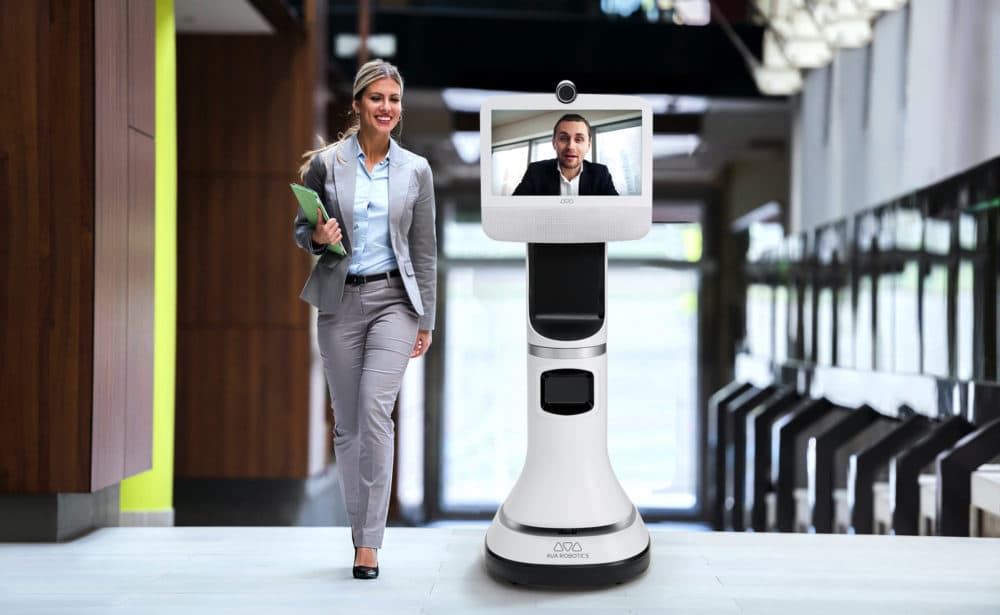Advertisement
Coronavirus Coverage
Beep Boop Back To Work: Robots Rebrand As Model Employees In The Age Of Social Distancing

It's not that Youssef Saleh doesn't like people. It's just that in the midst of a global pandemic, he doesn't want to risk breathing strangers' germs when he goes shopping.
"I mean, I don't know about you — now, when I go to a store, I would rather interact with machines than people," he said.
Saleh, chief executive of Cambridge-based Ava Robotics, is working to grant his own wish. His company's machines already wheel around some COVID-19 hospital wards, allowing doctors to make their rounds virtually by appearing on the robots' eye-level screens, while avoiding any chance of exposure to disease.
As offices, shops and other public places gradually reopen — with fewer people, keeping farther apart, than usual — Saleh envisions robots becoming ubiquitous beyond medical settings. His firm is one of several in Greater Boston that view the coronavirus outbreak as a potential turning point in public perceptions of robots.
"People used to think of robots as a threat, to say the least," Saleh said. "And I'm seeing this shift from that to being an agent of safety."
After all, a mechanical cashier or concierge can't give off those dreaded respiratory droplets everyone is trying to avoid.
Robots already perform some of the tasks Saleh has in mind, like greeting shoppers in certain stores, but the reception has been lukewarm, at best. In the age of physical distancing, robot makers hope people who previously complained about bots' lack of personal touch will come to see them as just the thing to reduce shared airspace and halt disease transmission.
"As companies think about how they're going to operate in the next one to two years, having robots help out is probably fortuitous, assuming there are still constraints on how you space people in facilities because of COVID," said Vince Martinelli, the head of product and marketing at RightHand Robotics in Somerville.
Advertisement
RightHand makes automated mechanical arms for factories and warehouses. Throughout the robotics industry, "everybody is seeing increased interest from customers," according to Martinelli.
Southie Autonomy in South Boston also makes robotic arms and is marketing them as employee health products. A banner atop the company's website declares, "Our mission is to help manufacturing workers maintain safe distances by using robots."
Chief Executive Rahul Chipalkatty said he hopes workers who have been wary of automation will start to consider these factors: "One, I can be more productive by having a robot be my tool. Two, I also get a little bit of protection in these times, with the pandemic. I can get a little bit of that separation."
Workers may value separation from colleagues in a way they didn't before COVID-19, but robots remain a tough sell, said Sean O'Brien, president of Teamsters Local 25 in Boston, whose members include warehouse workers.
"They replace a job with a robot, you could potentially put a family on the street," he said. "And you know what? Obviously the robot doesn't breathe, doesn't contract viruses. But if I walk by a robot and bump into it, could I catch something from that? I don't know."
It's not just the rank and file who need convincing. Gary Saunders, chairman of the Saunders Hotel Group, said he could not imagine a robotic receptionist checking in guests at the luxury Back Bay hotel his company plans to open in 2022 — despite the potential benefits of a clerk who never coughs or spikes a fever.
"All I can say is that I hope our transacting does not devolve to that level of remoteness," Saunders said.
Still, there may be other industries where robots prove useful. In a robotics lab at the University of Massachusetts Lowell, mechanical engineer Yan Gu leads a team that is working on full-size, humanoid robots that could someday serve customers on planes or trains.
That day, if it ever comes, remains a long way off, according to Gu.
"There are still so many challenging tasks we need to solve in order to enable those advanced, fully autonomous, fully intelligent robotics applications," she said. "I want to reassure people, society, that we are still far from having that ready."
This segment aired on June 2, 2020.
